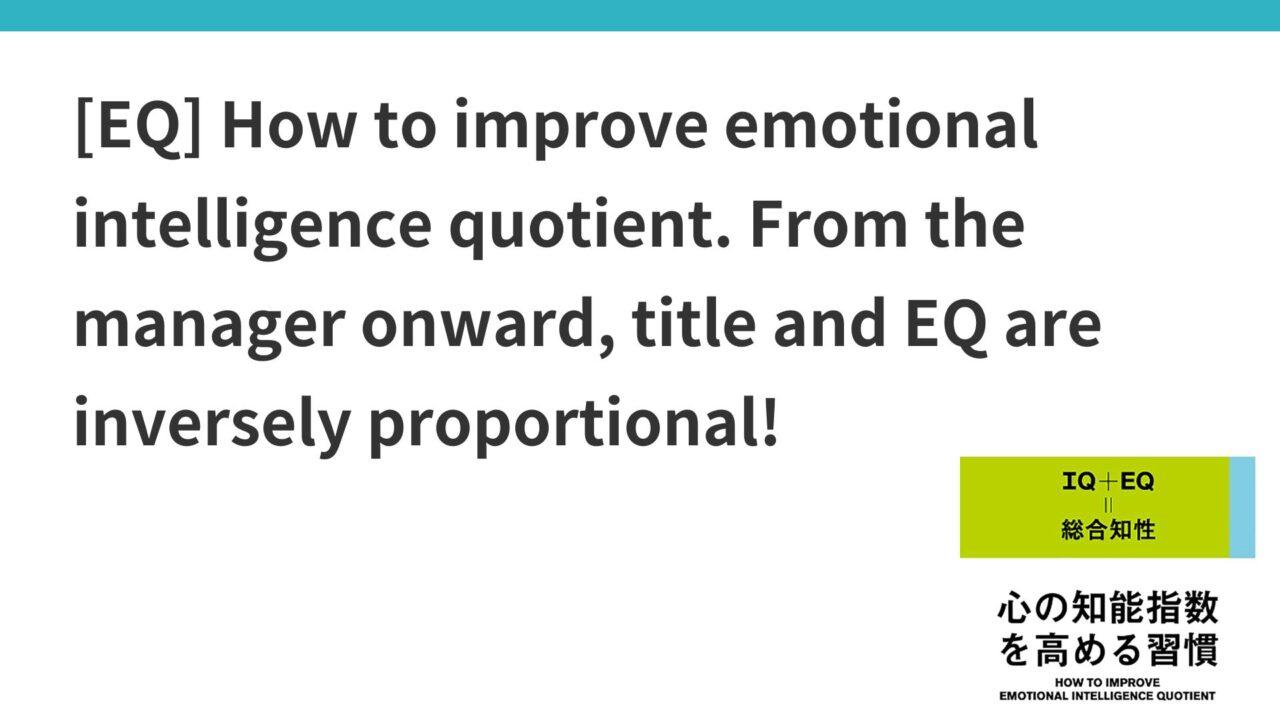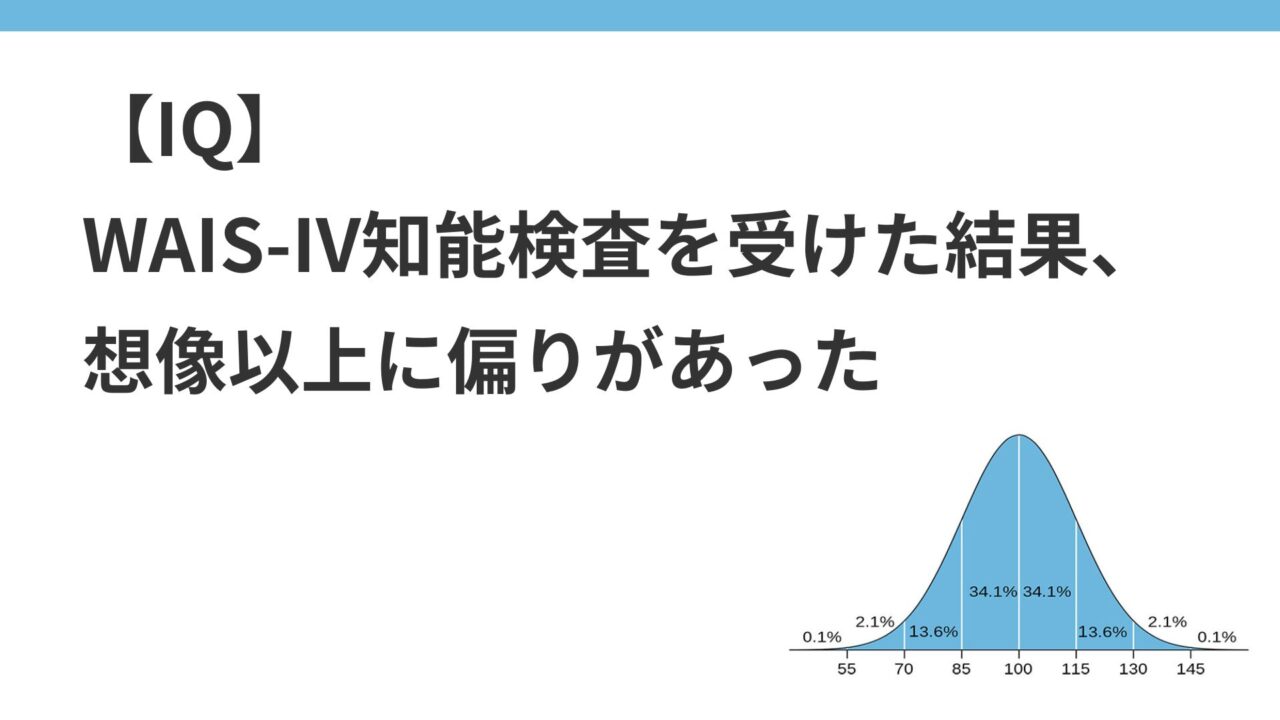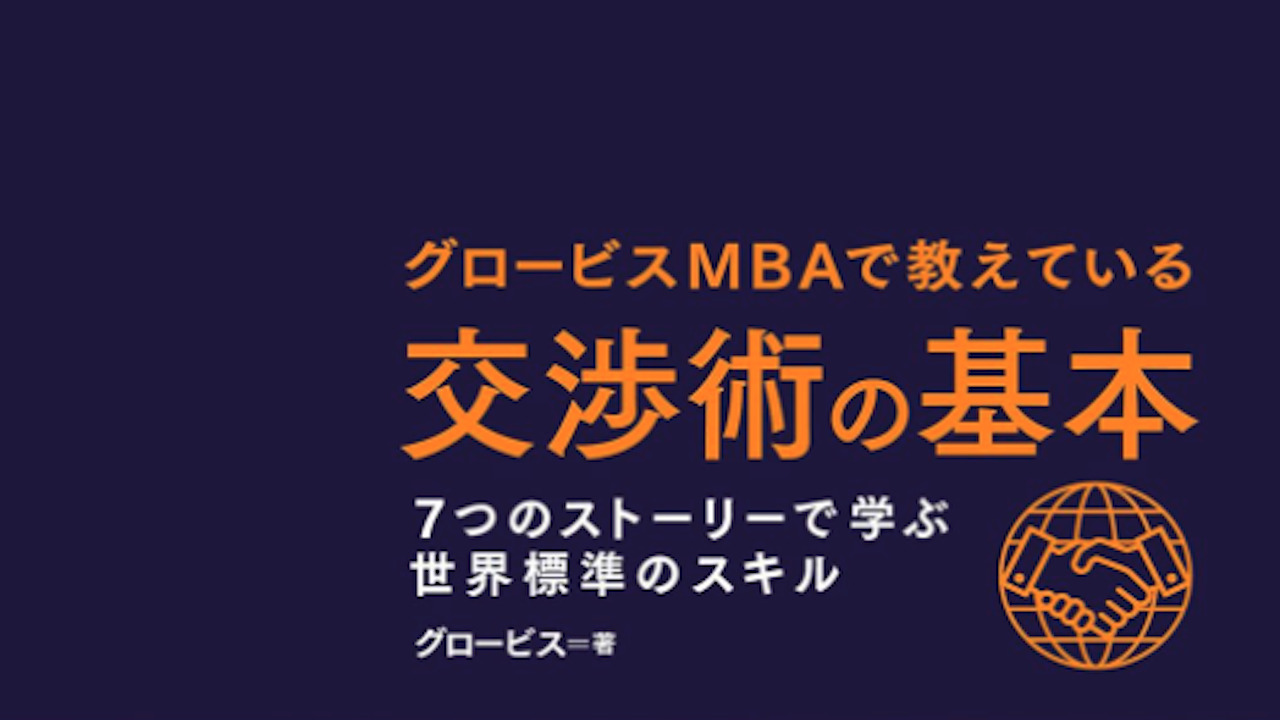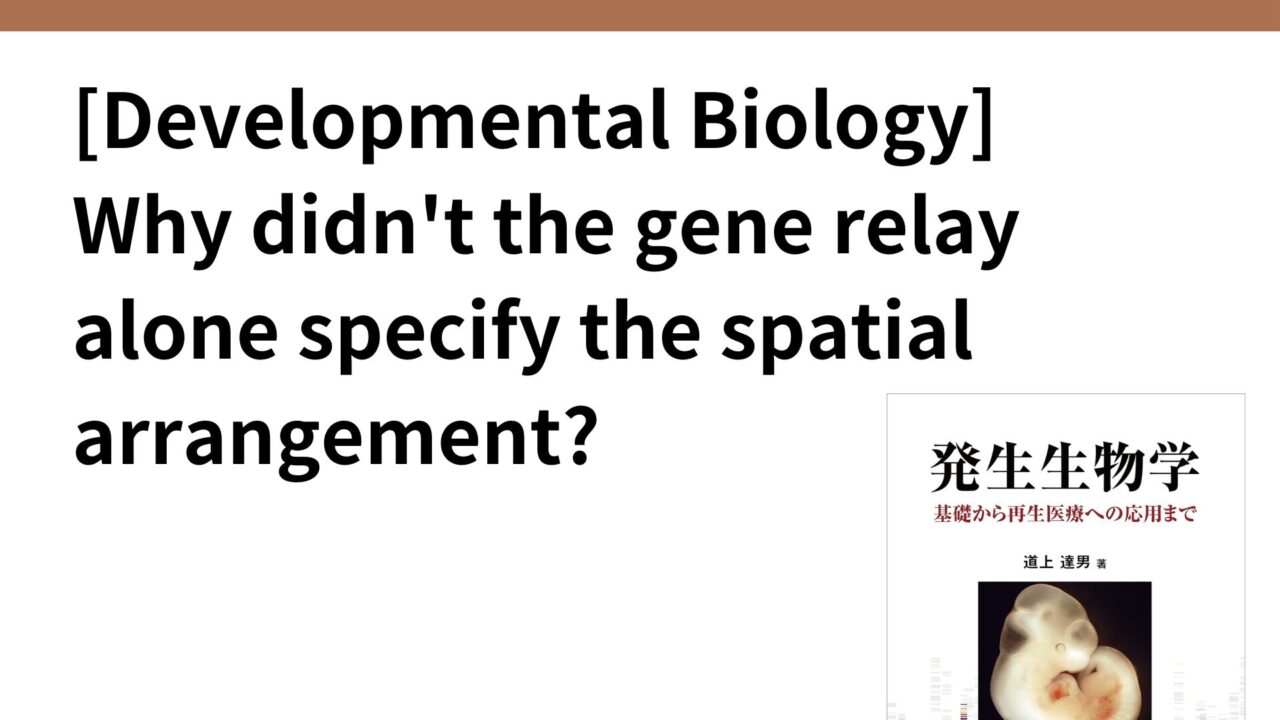- Introduction.
- What is EQ?
- Why is EQ not rising? Authority and Ego
- 4 Steps to EQ: Self-Understanding → Emotion Management → Empathy → Relationship Management
- Step 1 (Self-understanding): Write an emotion diary. Do not evaluate against feelings.
- Step 2 (Emotional Management): Creating gaps and moving away from monkey-like reactions
- Step 3 (Empathy): From “I understand. From “I understand” to “I want to understand
- Step 4 (enhance the relationship): Break away from building positives.
Introduction.
We have previously described IQ in this article.
In the same vein (?), I was also interested in EQ. I was also interested in EQ, so I read this book. I had been thinking that EQ = empathy, but I was made aware that my perception of EQ was too narrow.
By the way, here is the EQ scoring described in this book. At a glance, the questions are not only about empathy, as it is commonly referred to. This book also includes GRIT, which has been talked about for a while, as part of EQ.
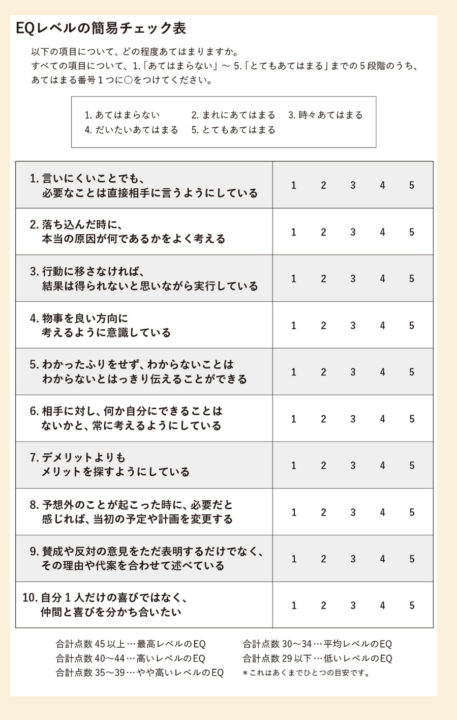
What is EQ?
EQ stands for Emotional Intelligence Quotient, with an E (Emotional) in front of IQ.
This book defines EQ as follows
EQ is the ability to take optimal action by controlling one’s emotions while understanding oneself and others
Habits to Increase the Intelligence Quotient of the Mind: Masaru Miura (Author)
Well, it seems that the concept is not narrowly defined only in terms of so-called empathy, but in a broader sense.
He then stated the following in comparison to IQ
EQ is deeply associated with business performance, and this difference is said to produce even large differences in income levels. And we know that its impact is by far greater than IQ, the intelligence quotient of the head.
IQ is a very important ability, but IQ alone limits what we can do to the range of questions that have answers, and does not extend to the exploratory skills required when we must solve questions that do not have answers. When EQ is added to IQ, our intelligence is elevated to intelligence.
Habits to Increase the Intelligence Quotient of the Mind: Masaru Miura (Author)

However, even the most talented people have a limit to what they can accomplish on their own, so people who make many people want to work with them (this book states that increasing EQ will enhance relationships with people and create collective knowledge) are likely to have higher annual incomes. ) are likely to have higher annual incomes.
And “EQ can be acquired and enhanced”.
As for here, I personally think that whether or not EQ can be acquired and enhanced is conditional, but I’ll spare you.
Why is EQ not rising? Authority and Ego
He said that while EQ can be acquired and increased, it can also be lowered.
Two reasons cited for this are authority and ego.
Authority: Title and EQ are inversely proportional after manager
First, regarding authority, an interesting finding was that when EQ was compared to title, the manager class had the highest EQ, and thereafter, EQ tended to decrease as the title increased.
As they rise in position and gain authority, they become lazy in “reading the feelings of others” because their subordinates and people in other departments are driven only by their position power.
The common saying “top management is solitary” means that in important decisions, one is often forced to make decisions alone, and at that point, there is a battle against loneliness, but in interactions with others, one does not become lonely. He sees that “ we become lonely not because of our position, but because we begin to misunderstand in our relationships with others.

Ego: fear → ego → EQ↓.
Ego is another factor that lowers EQ.
Ego is a self-centered attitude or behavior, but behind it is fear. When pressure and stress become excessive, we become fearful of ourselves and our future, and in an attempt to avoid them, we develop egoistic attitudes and behaviors.
For example, if a person is promoted to a higher position and feels that he or she must demonstrate leadership but lacks the confidence to do so, he or she may become overbearing, trying to create a strong leader in order to avoid the fear of being judged by others to be unfit to lead, and so on. They cannot afford to think about others and their EQ goes down.
4 Steps to EQ: Self-Understanding → Emotion Management → Empathy → Relationship Management
The following are four steps to increase EQ. We will look at them in order.

Step 1 (Self-understanding): Write an emotion diary. Do not evaluate against feelings.
To be able to think about others, you must first be well-rounded. It is important to start with self-understanding first, rather than trying to develop empathy out of the blue.
However, the concept of self-understanding is a broad one, covering a wide range of issues such as one’s values, habits of thought/behavior, and how to deal with stressful situations, but the focus here is first on “visualizing one’s feelings. The first focus here is to “visualize one’s emotions,” and one concrete way to do this is to keep an “emotion diary.
diary of one’s feelings
- As much as possible, every day, at the end of the day, write specifically only about how you feel.
- Scaling emotional intensity on a scale of 1-10 (very strong)
- Any amount at a time, one line is fine, or several pages if you want to write.
- Don’t evaluate your feelings in writing as good or bad.
- Reflections and reflections are not noted or are noted in a separate notebook (because once you are in the reflection and reflections mode, your emotions will be evaluated as good or bad)
Specific examples of emotional diaries were also noted.
I was told by my boss, ‘You should have done this much better. I felt a mixture of impatience at not being able to meet expectations and anger at being told that what I was working on was “just this much. I felt as if I was being taken lightly in some way. I feel quite angry and disgusted. Emotional intensity 7”
Habits to Increase the Intelligence Quotient of the Mind: Masaru Miura (Author)
Do not make an evaluation of the feelings described above, e.g., “I’m not good enough to feel disgusted by such things. I need to fix it,” etc. It is not acceptable to state something like that.
Since it is not wrong to have negative feelings in and of themselves, making one’s own evaluation of them can easily lead to self-denial. By describing both positive and negative emotions as they are in words, it is important to create a “self that has a third-party bird’s eye view of the emotion” separate from the “self that causes the emotion,” which is the purpose of an emotion diary. By doing so, you will be able to step away from your emotions and see them neutrally, and your self-denial will decrease.
It leads to self-acceptance that it is okay to be this way, no matter what emotion you are feeling, and it leads to a growing trust with yourself.
Step 2 (Emotional Management): Creating gaps and moving away from monkey-like reactions
Once you have deepened your understanding of your own emotions in Step 1, the next step is to make sure that you practice creating a gap between external stimuli and your reactions to them.
As the database of one’s own emotional expression mentioned earlier is accumulated, one can begin to understand one’s response patterns to stimuli, such as, “In this kind of situation, I tend to show this kind of emotion.
Emotions are reactions that arise from the predictions that the brain makes in the moment. People create predictive patterns based on what they have felt from their past life experiences. Therefore, if we understand and control the predictive patterns, we can control our emotions.

Therefore, once you have a certain amount of your own emotional database, you can change from the monkey-like behavior of reacting immediately to stimuli to “Oh, I feel bad about this situation now → I feel bad about myself (another overarching self) → I wonder why → Come to think of it, this is the same as that time in the past. → “Let’s deal with it this way” and can change to a reaction that creates a gap.
Although not mentioned in this book, the following may also be useful with regard to the emotion of anger.
- Impulsive anger lasts only 6 seconds (know that)
- First, take a deep breath. Concentrate on the breath -> immediately thereafter switch to meta-cognition of the emotion and go into live action mode (why did I get angry? )
In my experience, 70% of the time when we are angry, it is our own fault (our anger is directed at the other person or the outside world, but in fact the other person is a mirror, and we are often angry because they point out our own pain points).
The rest are mostly miscommunications (cognitive discrepancies), and there are several methods, such as switching to teleconsultation in the case of text communication.
Less than 5% of the time it is truly unreasonable and not my fault. It’s cheaper said than done, but harder to do.
Step 3 (Empathy): From “I understand. From “I understand” to “I want to understand
The third way to improve EQ is empathy.
I understand. It is important to have an attitude of “I want to understand, I want to understand” rather than “I understand. It is important to have an attitude of “I want to understand, I want to understand” toward understanding others.

What is important is to have an attitude of trying to understand the other person rather than the fact that you are able to empathize with him or her. The empathy of “I understand, I understand” is more focused on the sympathetic self than on the person you are talking to, and this does not allow you to understand his or her true feelings.
Not mentioned in this document, but will the following correspond?
- Understand. Sympathy of understanding: emotional empathy
- I want to understand. Empathy to understand: cognitive empathy (though I think it’s a bit more nuanced).
Step 4 (enhance the relationship): Break away from building positives.
The final step in increasing EQ is relationship.
In particular, how do we move from being positive with a built in attitude to “positive with a real heart”?

Positive by construction
I will do my best to follow your instruction A.”
Honest and Positive
I feel that I am not able to do the job “A” as you have instructed me to do. If possible, could you please let me proceed in the manner of B?
Tatemae positivity may seem safe at first glance, but this is actually a state of “holding yourself back and working hard,” forcing you to act contrary to what you want, and it does not last long. It will not last long, and it will result in physical illness.
He defines “honest and positive” as “making frank and positive assertions with the viewpoint of benefiting both oneself and others, rather than with an attitude of trying to push one’s own self-important ego.
The vectors of what we are doing and our awareness overlap with the part that describes the art of negotiation as “from a zero-sum situation to value creation.”
Can I keep up appearances? Instead of focusing on yourself and the other person, focus on the common goal of the other person, which is the achievement and accomplishment of the work, and try to think backwards from that goal in your mindset when dealing with the other person.
